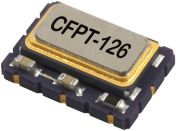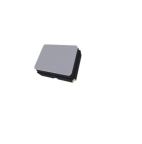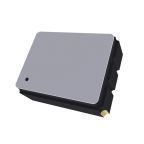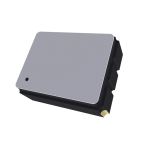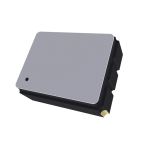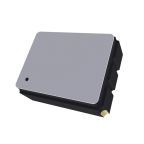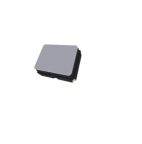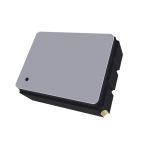TCXO Oscillators
TCXO's (Temperature Compensated Crystal Oscillators) are used in designs that require better temperature stability than XO or VCXO oscillators. TCXO Oscillators can achieve stability of less than 1ppm as opposed to a typical crystal of 30ppm.
Better temperature stability options are available in TCXO's, from 5ppm to 50ppb. TCXO oscillators vary in size from the smallest 2.0 x 1.6mm to larger sizes and even TH devices used in military applications. The key factor to consider when selecting a TCXO is the temperature range over which it operates. -20'C to 70'C is common with -40'C to 85'C a premium, especially at tight tolerances.
How do TCXO's work?
TCXO Oscillators use a compensation network that senses the change in frequency over temperature and creates a near inverse curve. This is used to pull the TCXO back to the nominal frequency. The remaining error is the stated stability, e.g. 1ppm over -20'C to 70'C meaning the error from nominal should be no larger over that temperature range.
Digitally controlled TCXOs are also available and these tend to fall into the smaller packages and more cost-effective solutions. These oscillators use internal ADC's (analogue to digital converters) monitoring the temperature but follow the temperature change in digital steps related to the ADC value.
These types are unsuitable for GNSS solutions due to the frequency jumps over temperature.
VCTCXO - Voltage Controlled Temperature Compensated Oscillator
VCTCXO Oscillators have the same features as the TCXO with the added functionality of a voltage-controlled function to allow precision tuning of the output frequency. The VCTCXO differentiate themselves by having a VC pad (voltage control) in the oscillator. This input requires an analogue voltage that works to control the varactor inside and is normally part of an external PLL that controls the VCTCXO frequency.
관련된 링크들
- Crystal Oscillators
- OCXO Oscillators
- MEMS Oscillators
- MERCURY 25MHz TCXO Temperature Compensated Crystal Oscillator, Clipped Sinewave ±2.5ppm VM53SVM53S3-25.000-2.5/-30+75
- Abracon 32.768kHz TCXO Temperature Compensated Crystal Oscillator, CMOS ±5.0ppm SMDATXK-H14-E-32.768kHz-E50-T3
- VCO Oscillators
- Crystals, Oscillators & Resonators
- Abracon 10MHz TCXO Temperature Compensated Crystal Oscillator, CMOS SMDATX-H12-F-10.000MHz-F25-T
